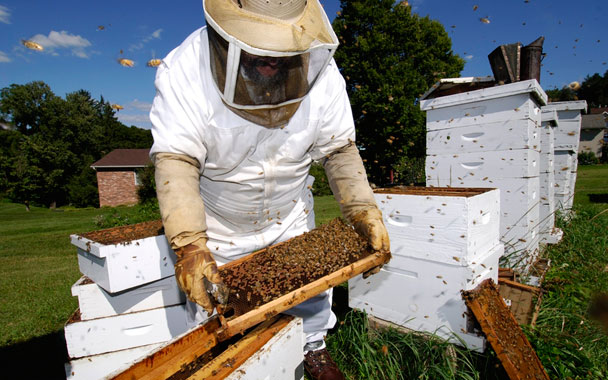The Latest Buzz
Colony collapse disorder is a devastating disease that has wiped out hives across this country. That’s bad news even if you never use honey: As they fly about gathering nectar, the busy insects pollinate plants that produce one in every three bites of food we take. Even more disheartening, despite an infusion of $20 million from Congress over the past two years, scientists have not been able to pinpoint what causes the illness. Is it a virus? Stress? Parasites? Pesticides? Or some combination thereof?
(You really owe it to yourself to read Gourmet food editor and resident beekeeper Ian Knauer’s poignant account of dealing with a collapse in his own hives, if you haven’t read it already. Fair warning: have a box of tissues at hand—you are quite likely to need to dry your eyes.)
In recent weeks, a new suspect has appeared on the scene. Following a complaint in August by a coalition of beekeepers, a German prosecutor is seeking information from Bayer CropScience about the possibility that a pesticide it sells may be the real culprit here. German regulators have suspended sales of the chemical, called clothianidin.
On this side of the Atlantic, shortly after the German announcement, the Natural Resources Defense Council (NRDC) sued the Environmental Protection Agency (EPA) in an attempt to get it to release information that it has on clothianidin and other pesticides. The agency, which approved clothianidin in 2003 under the condition that Bayer conduct studies into the product’s impacts on bees, failed to comply with an earlier NRDC request under the Freedom of Information Act.
Could it be that the EPA has something to hide?
A Real Nut Case
A group of California almond growers and shippers has just hauled the USDA into federal court hoping to reverse a year-old ruling that requires almonds be blasted with steam or gassed with a fumigant—propylene oxide, a likely human carcinogen—to kill salmonella bacteria that may or may not be present on raw nuts.
The requirement has had devastating financial effects on small, organic producers. Foreign-grown almonds are exempt from the ruling, so consumers who prefer not to eat “raw” nuts that have been steamed or fumigated are opting for imports, driving prices down for home-grown products.
“This ruling is killing the California organic almond business,” said Steve Koretoff, a grower and plaintiff in the suit.
Sex, Drugs, and Fish Farms
Earlier this summer I expressed alarm after learning that the federal government was pushing ahead with plans to allow abandoned offshore oil rigs to be converted into fish farms, even though its own Government Accountability Office pointed out that there was insufficient information on the environmental damage that large-scale, deep-water aquaculture operations could wreak.
At the time, I wondered why the administration gave responsibility for overseeing the new aquaculture ventures to the Minerals Management Service, a collector of royalties from oil companies, rather than an agency that had experience in matters related to, let’s say, fisheries, oceans, or the environment.
This week, I got my answer when the Interior Department’s own inspector general came out with a scathing report containing allegations that Minerals Management officials had used cocaine, cut themselves sweet financial deals, accepted gifts from energy companies, and engaged in sexual misconduct with employees of those companies.
With all that fun stuff occupying their workdays, the bureaucrats probably wouldn’t have had any time to monitor offshore aquaculture operations. Just the sort of laissez-faire approach this administration likes to bring to environmental oversight.




 Pinterest
Pinterest


